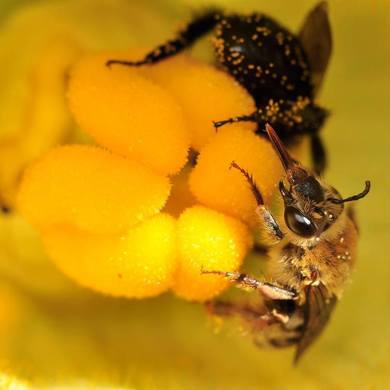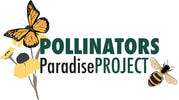 Squash Bee Squash Bee This was posted on our blog in September, 2015. Susan Chan is coming back to town for Disappearing Act: part 2! Pollination biologist and practicing agriculturalist, I caught up with Susan, before her talk on Oct 27th. What comes first for Susan, pollinators or growing food locally? “The two are intrinsically intertwined,” she replies. Susan is interested in food for humans, but also food for everyone else—that is, for all creatures and plant reproduction, since plants are the first layer of our food chain. A self-proclaimed “whole system thinker,” Susan believes that the healthier the whole system is, the more resilient we are as communities. “The way to be more resilient is to have a whole bunch of players in the field,” she says. About twenty-five years ago, Susan became interested in the honeybee while studying with Peter Kevan (University of Guelph). She describes Peter as being “ahead of his time.” He pointed out that we couldn’t have food production predicated on one pollinator—the honeybee, which is not even native to this country. He pushed the Ministry of Agriculture to do more for native bees. This opened up a whole new interest for Susan: solitary bees and pollinators. One particular bee caught Susan’s attention—the squash bee (now her area of expertise). The squash (and pumpkin) bee is a specialist bee at particular risk from neonicotinoids. "Why the draw," I ask Susan? “I fell in love with it. It’s a very gentle, beautiful bee, with a very interesting life. I feel like I didn’t have any choice; this is what I had to do. It chose me.” “Bees are a poster child but they are representing a bigger size of the pie, this is an insecticide that kills all insects,” Susan points out. I ask whether she is working with the Aboriginal/First Nations community in any capacity. Susan tells me that in fact, the squash bee is a “First Nations’ bee,” belonging to Indigenous culture, and originating in Central America thousands of years ago. It followed their activities and cultivation to Canada: “It’s an immigrant, like the rest of us.” "Susan reports that she had the opportunity to speak to a group of First Nations people (Association of Iroquois and Allied Indians, AIAI) in partnership with Farms at Work for the Kanienkeha:ka (Mohawk) Flint Corn Seed-Saving & Education Project and is keen for their support in seeing the squash bee established at permanent nesting sites. “It could be a First Nations’ symbol,” Susan muses."
2 Comments
|
Archives
September 2018
Categories |
|
|
Butterflyway Hamilton: www.facebook.com/butterflywayhamilton/
Environment Hamilton: https://www.environmenthamilton.org/ Hamilton Naturalists' Club: https://hamiltonnature.org/ |

 RSS Feed
RSS Feed